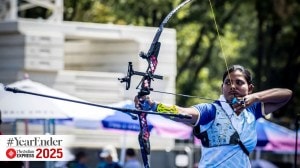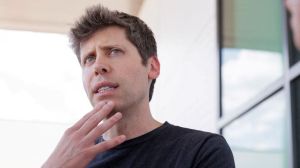Educating the masses through films
CHANDIGARH, June 15: City girl Payal Randhawa is the recipient of the University Grants Commission award of the Best Series and the Best Res...

CHANDIGARH, June 15: City girl Payal Randhawa is the recipient of the University Grants Commission award of the Best Series and the Best Research for the Consortium of Educational Communication of the UGC for the year 1997.The award was given for the series of films made on 8220;The Human Mind8221; centering around mental disorders.
After a peripatetic graduate education, Payal did a postgraduate course in Mass Communications from Jamia Millia Islamia in 1989. It was while doing the course itself that Payal found her 8220;load star.8221;
Her graduation film, 8220;Match for the Rat8221;, along with course mate Sanghay Lhaaten, got her the highest marks. The story line of the film centered around one of the stories from the Panchtantra. Mother and father rat wanted their daughter to be married to the most powerful individual on the earth, even though their daughter was in love with a rat. Chasing the sun, cloud, wind, rock and bull they finally found that the most powerful individual was a rat itself.
After graduating from Jamia Millia, Payal started doing a lot of work with numerous video magazines which were booming at that time. She worked for 8220;Aaj8221; a video magazine launched by the Hindustan Times group, which never took off. 8220;I did a lot of stories for them. But the video boom fizzled out four years ago, when channels like BITV, UTV, and a whole lot of satellite channels either sold out or retrenched,8221; she says. As a result the bubble burst. Young, sometimes even inexperienced people, were offered a lot of money. Many left secure jobs in the print medium succumbing over rated salaries with the private channels. After sometime the mushrooming companies could not give afford to pay the salaries so the retrenchments started.
After a gap of these years satellite channels are now rebuilding themselves again. Today the situation for professionals in the field is very different. 8220;You have to prove yourself to get work,8221; Payal says.
For the last nine years, Payal has been working as a freelancer, mainly for UGC, at MCRC, Jamia Millia. 8220;MCRC gives you all the scope to explore all your talents. In our days, we were paid to study. Today, the students have to pay expensive fees to learn. The facilities at the Institute are one of the best in the country, second only to FTII at Pune. We are taught on a Beta Cam, with the state of art equipment. The studios are extremely well equipped.8221;
Payal has opted for making educational films. She works as a director, gets a director8217;s fees, with everything else from the equipment and crew provided by the MCRC. That is why Payal always prefers to work on a series of films, which helps her to survive financially. 8220;This is what I enjoy doing best. I find making educational films very enriching. You are always learning, there is no stagnation. A lot of research and work is involved. It is no nine to five job. You have to be working all the time, odd hours included. But it is a lot of fun.8221;
Payal has lost count of the exact number of films she has directed and made till now. Some of her satisfying work has been a series on the 8220;Development of jewellery design from the Indus Valley to the Mughal period,8221; where she viewed jewellery as an amalgamation of different influences. Through the stones and their setting, insight can be got into the trade routes and culture of the period. The evolvement of jewellery design over the ages was traced.
The other challenging series was 8220;Museums8221; where Payal looked into the preservation and conservation of antiquities. In her award-winning series on the human mind, Payal dealt with different forms of mental illness. What she focussed upon was the fact that mental illness should not be dismissed as 8220;paagalpan.8221; She tried to make the people aware about obsessive, compulsive disorders, to spread the message that there is nothing to be ashamed about. 8220;It is treatable, though not curable.8221;
Since Payal8217;s forte is educational films, research is the vital force in her work. Once she decides on the theme, then the modus operandi is almost similar for work. 8220;I go to different libraries, go through the periodicals, magazines and encyclopedias and read up as much a I can. This preliminary reading gives an insight into the subject, the buzz words and concept. And then I choose the subject expert, who becomes a kind of advisor, aiding and helping me in the development of the idea.8221; Payal prefers magazines and periodicals to specialized books, for the information given in the former is more interesting and friendly. 8220;Magazines are interestingly written with no jargon.8221; Till now she has found the USIS Library rather comprehensive for preliminary research.
The project she has on hand is a series of 26 films on 8220;Mapping the Decades8221; looking at the evolution of different fields in the last 50 years art, culture, army, science and technology, education, growth of bureaucracy. She has already made 10 films.
Interviewing stalwarts in their respective fields, artists like Kishen Khanna, B. C. Sanyal in the arts, Prof Yashpal in the field of science, she is juxtaposing their lives and experiences as a mirror to the development of society.
8220;The first seven minutes are dedicated to their experiences before Partition, then we trace their growth after Partition.8221;
On a vacation to Chandigarh, Payal watches a lot of television and cinema during her free time. 8220;Whether I like the serials or not, or Hindi cinema for that matter, I must watch, for that is the pointer to the market.
Serials and films tell me about my audience, their preferences, what is popular, and to communicate you must know what language you must speak in. The popular programmes are the best pointers in the direction.8221;
- 01
- 02
- 03
- 04
- 05































